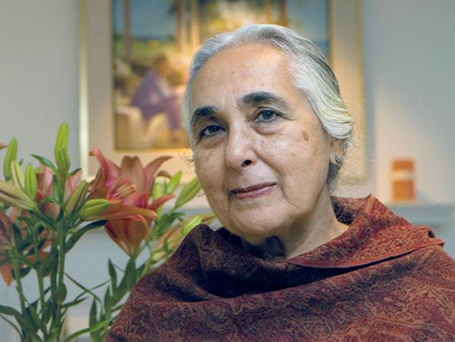Custom Search 1
About the NTICVA
Professor Romila Thapar
Professor Romila Thapar is an Indian historian whose principal area of study is ancient India.
After graduating from Panjab University, Romila Thapar earned her doctorate under A. L. Basham at the School of Oriental and African Studies, the University of London in 1958. Later she worked as Professor of Ancient Indian History at the Jawaharlal Nehru University, New Delhi, where she is Professor Emerita.
Thapar's major works are Asoka and the Decline of the Mauryas (1961 or 3), A History of India Volume One, and Early India: From the Origins to AD 1300 (1966), Ancient Indian Social History: Some Interpretations (1978), From Lineage and the State: Social Formations in mid-1st millennium BC in the Ganges Valley (1985), and Somanatha: the Many Voices of a History (2005).
In, Asoka and the Decline of the Maurya, Thapar situates Ashoka's policy of dhamma in its social and political context, as a non-sectarian civic ethic intended to hold together an empire of diverse ethnicities and cultures. She attributes the decline of the Mauryan empire to its highly centralized administration which called for rulers of exceptional abilities to function well. A History of Indi, written for a popular audience, encompasses the period from its early history to the arrival of Europeans in the sixteenth century. Ancient Indian Social History deals with the period from early times to the end of the first millennium, includes a comparative study of Hindu and Buddhist socio-religious systems, and examines the role of Buddhism in social protest and social mobility in the caste system. From Lineage to State analyses the formation of states in the middle Ganga valley in the first millennium BC, tracing the process to a change, driven by the use of iron and plough agriculture, from a pastoral and mobile lineage-based society to one of settled peasant holdings, accumulation and increased urbanisation. The book on Somanatha juxtaposes various historical references to the temple at Somanatha and shows how by selecting one and excluding others, it was possible for the history of the temple to be converted into a political slogan.
Thapar has been a visiting professor at Cornell University, the University of Pennsylvania, and the College de France in Paris. She was elected General President of the Indian History Congress in 1983 and a Corresponding Fellow of the British Academy in 1999. She is an Honorary Fellow at Lady Margaret Hall, Oxford, and at the School of Oriental and African Studies (SOAS), University of London and holds honorary doctorates from the University of Chicago, the Institut National des Langues et Civilisations Orientales, Paris, the Universities of Oxford, Edinburgh (2004), Chicago (2002) and Hyderabad. She is Foreign Honorary Member of the American Academy of Arts and Sciences.
In 2004 the U.S. Library of Congress appointed her as the first holder of the Kluge Chair in Countries and Cultures of the South and she was awarded the John W Kluge Prize in 2008 for Lifetime Achievement in the Humanities.

